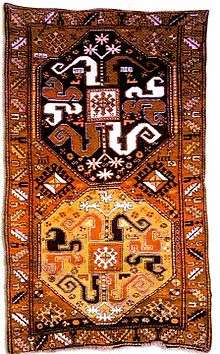Keşkek
| Ceremonial Keşkek tradition | |
|---|---|
|
A Keşkek meal from Tokat, Turkey | |
| Country |
Turkey |
| Reference | 388 |
| Region | Europe and North America |
| Inscription history | |
| Inscription | 2011 (6th session) |
Keşkek, also known as Kashkak and Kashkek; is a sort of ceremonial meat or chicken and wheat or barley stew found in Turkish, Iranian and Greek cuisines.
In 2011, Keşkek is an Intangible Cultural Heritage of Turkey confirmed by UNESCO.[1][2]
History
It is documented in Iran and Greater Syria as early as the 15th century and it is still consumed by many Iranians around the world. The origins of this dish ultimately allude to Kashk, which, in 16th- to 18th-century Iran had sheep's milk added to wheat or barley flour and meat, mixed in equal parts.[3] Keşkek is traditional for wedding breakfasts in Turkey. Under the name of κεσκέκ, κεσκέκι and κισκέκ, it is a festival dish in Lesbos[4] and Samos[5] as well as among the Pontian Greeks[6] and in Epirus[7]
In Lesbos, keskek is prepared on summer nights when a ceremonial bull is being slaughtered, which is then cooked overnight and eaten next day with wheat.[8]
Keşkek is called "haşıl" in Northeast and Middle Anatolia regions in Turkey. In both Turkey and Iran, it is a common dish and frequently consumed during religious festivals, weddings or funerals.
Keşkek is very similar to the Armenian dish called harissa.
The Slavic word kasha may have been borrowed from the Persian kishk[9] or both may be cognate with the Sanskrit word kashaya 'medicinal drink'.[10]
See also
Bibliography
- ↑ Convention for the Safeguarding of the Intangible Cultural Heritage, Intergovernmental Committee for the Safeguarding of the Intangible Cultural Heritage, Nomination file 00388
- ↑ "Turkish dish and Korean tightrope walking join UN intangible heritage list", UN News Center 28 November 2011
- ↑ see Aubaile-Sallenave
- ↑ Caragh Rockwood - Fodor's Greece 1997
- ↑ Γιουβέτσι με στάρι
- ↑ Κεσκέκ (Παραδοσιακό ποντιακό φαγητό)
- ↑ see Aglaia Kremezi - 'Γιουβέτσι με στάρι' ('Giouvetsi with wheat')
- ↑ Greece, by Paul Hellander, Lonely Planet series
- ↑ Gil Marks, Encyclopedia of Jewish Food, p. 314
- ↑ Aubaile-Sallenave, p. 109, note 7
- Françoise Aubaile-Sallenave, "Al-Kishk: the past and present of a complex culinary practice", in Sami Zubaida and Richard Tapper, A Taste of Thyme: Culinary Cultures of the Middle East, London and New York, 1994 and 2000, ISBN 1-86064-603-4. excerpts
External links
- Cooking keskek in Lesbos
- Cooking keskek for the Bull's Festival in Ayia Paraskevi, Lesbos in 1996
- A plate of Turkish chickpea keşkek in Merzifon on the Black Sea coast.
| ||||||||
| ||||||||||||||||||||||||||||||||||

